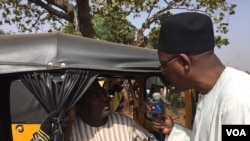WASHINGTON, D.C. —With Boko Haram militants waging increasingly audacious attacks and political tensions skyrocketing ahead of the March 28 elections, Nigeria could see a repeat of the devastating 2011 election riots, unless politicians avoid appeals to religious differences among voters, political activists warned at a special Voice of America sponsored town hall Friday.
The town hall was designed to discuss ways of preventing a recurrence of the violence of 2011, and was carried live on radio by VOA’s Hausa Service, and live-streamed on VOA Dandalin, a 24/7 mobile platform providing news and music. Voice of America has more than twenty journalists in northern Nigeria covering the election and the Boko Haram threat—local Nigerians as well as international reporters—which is among the largest efforts to cover the region by any media organization. Among them is Ibrahim Ahmed, a seasoned VOA journalist whose courageous reports late last year from villages and towns still smoldering after Boko Haram attacks were widely praised. Ahmed organized the Kaduna town hall session. A report on the event can be seen on VOA’s English website.
Danjuma Bello Sarki, a youth leader involved with a ruling party gubernatorial campaign in Kaduna State, north of the capital Abuja, told the town hall that politicians were to blame for stoking tensions, and risking electoral violence.
“I think if the politicians themselves would agree to act normally, according to the rules, then a lot of this severe crisis we have with the election would be diminished,” he said. “Let them not bring their religious differences into politics. They should allow people to elect people based on the qualities … they possess and the promises to deliver to the people.”
About seventy people, ranging from 18 to 35 years of age attended the town hall, which took place in Kaduna, a city of roughly 2 million in northeastern Nigeria, the region where Boko Haram militants have committed widespread atrocities. Most were from the youth wings of Nigeria’s two largest political parties, the ruling People’s Democratic Party (PDP) and the All Progressives Congress (APC), the leading opposition party. The audience also included representatives of NGOs and civil society groups.
In 2011, Kaduna experienced some of the worst violence during the post-election riots. More than 800 people died in the weeks following the April 2011 election that pitted incumbent President Goodluck Jonathan against Muhammadu Buhari, a former military officer who ruled the West Africa powerhouse following a coup in the mid-1980s. Buhari is challenging Jonathan once again this year, and last month’s decision by national election officials to postpone the vote has strained relations between the ruling PDP and Buhari’s party organization, the All Progressives Congress.
Umar Yahaya, who heads the APC youth campaign effort in Kaduna, said the 2011 election was marred by flawed vote counting procedures that resulted in some ballots being tampered. Protests that year by Buhari’s supporters snowballed into violent riots and sectarian killings in many northern states, including Kaduna. Jonathan is a Christian from Nigeria’s oil-rich south; Buhari is a Muslim, whose support base is mainly in the north. Still, Yahaya praised the work this year by the Independent National Electoral Commission at the town hall meeting, and predicted the March 28 vote would be more efficient and transparent.
As Africa’s most populous nation, one of the continent’s largest economies and a major exporter of oil to the United States and elsewhere, Nigeria’s stability is considered crucial, not only for West Africa but for a much wider geographic region. Rampant corruption, however, has hamstrung its development, along with persistent grumbling by the largely Muslim north that the country’s vast oil wealth has only benefited the mainly Christian south. Boko Haram’s origins are rooted in an effort to fight that corruption, before it evolved into a murderous, fundamentalist group.
VOA Hausa plans another live town hall meeting broadcast in mid-March from Nigeria’s largest city, Lagos, in the south. It also has plans to stage a series of call-in shows at affiliated radio stations in Abuja, Kano, Dutse, Nagarta, and Nasarawa between February 28th and March 21st.
“Our goal,” says VOA Hausa Service Chief Leo Keyen, “is to set the standard for coverage of the election, and the Boko Haram threats which are making it so hard for Nigeria to hold this important vote.”
“I feel that I have the obligation to bring the story to the world.”
--Ibrahim Ahmed
Born in Bauchi, Nigeria, Ibrahim Ahmed, recently travelled through the three most dangerous states of northeastern Nigeria: Borno, Yobe and Adamawa, filing extraordinary multi-media coverage of the impact of Boko Haram violence on the people of the region. On Friday February 20th, 2015 he hosted a town hall meeting of youth leaders, Nigerian election commission officials, youth organizations and others in Kaduna, scene of 2011 post-election violence, to discuss ways of preventing a reoccurrence during the 2015 elections.
Ahmed created the first website for a language service in the VOA African Division in 1995 for Hausa, and has been a driving force behind VOA’s most successful digital effort since then. His coverage has included both video and audio interviews with Nigeria’s Vice President, Namadi Sambo, opposition presidential candidate, General Muhammadu Buhari, former President Ibrahim Babangida, spokesmen of the two main campaigns, PDP and APC, lawmakers, ordinary people on the streets, market traders and many more.
“It is extremely important for me not only as a professional journalist but also for personal reasons,” says Ahmed. “I was born and grew up in this part of Nigeria where, because of a vicious attack by Boko Haram, people are being killed in thousands. More than a million have been displaced; the economy is devastated. I feel that I have the obligation to bring the story to the world.”





